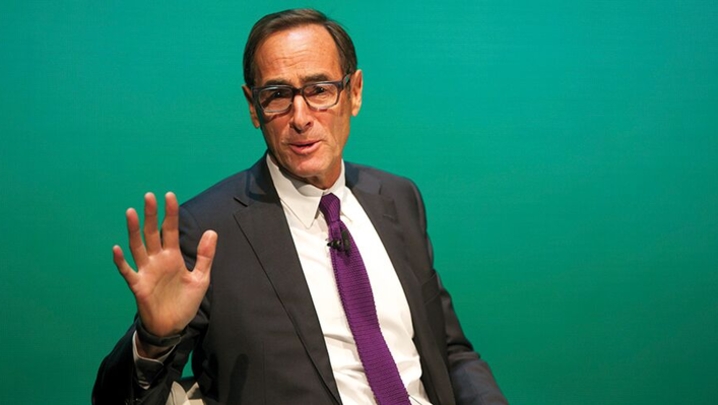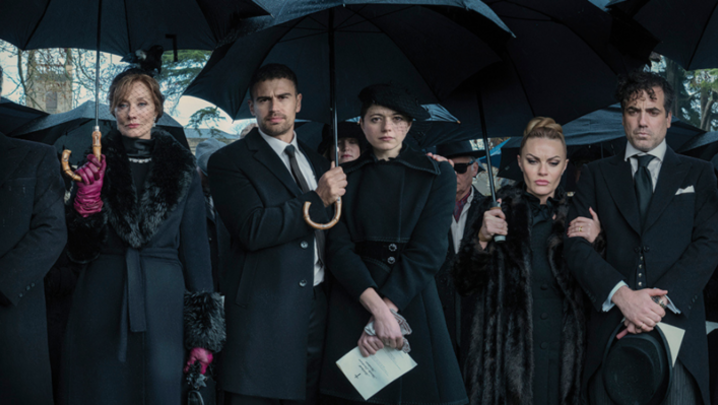Josh Sapan transformed AMC Networks by backing shows such as Mad Men and extending its channels business beyond the US. Stuart Kemp profiles a deal-maker like no other
AMC Networks President and CEO Josh Sapan lays claim to having the world’s largest collection of antique lightning rods. "They’re architectural and a form of industrial art. I just got captivated by them," he explains.
One or two of them can be found lying around his office on Penn Plaza, a few blocks from the Empire State Building, alongside examples of another passion. This is his collection of panoramic photographs of people and places from the last century.
Gathered by Sapan over 30 years or so, the pictures have recently been collated into a coffee-table book titled The Big Picture: America in Panorama.
And then there is another growing collection: Sapan’s awards for hit shows and movies, as well as myriad prizes for his contribution to the cable industry – including the prestigious Paley Prize for Innovation and Excellence.
From his New York City base, one he describes as "looking like a junk shop," Sapan runs a burgeoning portfolio of entertainment brands. These include US cable television networks AMC, IFC, SundanceTV, WEtv and BBC America (a joint venture with BBC Worldwide that was acquired in late 2014).
His purview at the Nasdaq-listed cable empire, with its 2,000-plus staff, also encompasses feature-film labels IFC Films and Sundance Selects, and the group’s international programming and distribution division, AMC Networks International.
Sapan, a published poet (yep, those of a less driven disposition should stop reading now) has been inducted into The Cable Center’s Hall of Fame and Broadcasting & Cable’s Hall of Fame. He has also received The Media Institute’s Freedom of Speech Award in recognition of his contribution to the advancement and protection of free speech.
The bespectacled executive is credited with building some of television’s most influential entertainment brands and shows over the past decade, a period widely seen as a new golden age for television. Think AMC’s The Walking Dead, Mad Men and Breaking Bad and SundanceTV’s Rectify and The Honourable Woman, the latter co-funded by the BBC.
Sapan has also pioneered same-day theatrical and video-on-demand releases for independent films. His film credits include IFC Films’s Boyhood (winner of a Golden Globe Award for Best Motion Picture – Drama), the Oscar-nominated documentary Finding Vivian Maier, Sundance Selects’s Two Days, One Night (also Oscar-nominated) and IFC Midnight’s genre hit The Babadook.
And the world’s most successful lightning-rod collector also enjoys having a laugh. He turned IFC into a home for original comedies and comedic talent including Portlandia – winner of Emmy, Peabody and Writers Guild of America nods – and projects from Will Ferrell (The Spoils of Babylon and The Spoils Before Dying) and Denis Leary (Maron).
While the obvious metaphor would be that of a legendary impresario with a thaumaturgic ability to capture lightning in a bottle, the reality is more prosaic. Sapan’s willingness to invest in content and talent is, however, almost as rare as authentic wizards in a risk-averse economy. This is especially true for a listed company with a market capitalisation of $5.6bn shackled, as it is, with Wall Street expectations about future growth and returns.
It helps that AMC Networks’ biggest voting shareholders, Chuck (Charles) and Jim Dolan, two of the biggest media entrepreneurs in the US, provide support for Sapan and his board. They are prepared to take a punt on content that would give more conservative investors the fear.
"The Dolans are well known for being successful risk takers," Sapan says. He adds that a lot of AMC’s success comes down to invention and innovation, and trying things out before its competitors.
As an example, he cites the company’s decision to back Mad Men, Breaking Bad and The Walking Dead at a time when the marketplace considered the projects to be inappropriate, "expensive original programming, budget-wise, for basic cable."
The gamble paid off in terms of the shows’ international critical and cultural impact. Their success, says Sapan, emphasises producers’ willingness to invest in quality – and audiences’ demand for high-quality fare.
It is very important to be nimble... the world is moving more quickly than ever before
Named CEO in 1995, Sapan led AMC’s successful spin-off from Cablevision Systems Corporation in June 2011, when AMC Networks began trading on Nasdaq.
He is part of a well-established and tight-knit management structure at AMC Networks that includes COO Ed Carroll, AMC Networks Distribution President Bob Broussard and James Gallagher, Executive Vice-President and General Counsel across the portfolio.
The quartet boasts a combined experience of more than 40 years at the cable coalface. "We [the executive board] speak the same language and, because of the length of tenure together, we have developed a shorthand of sorts that enables us to move quickly and take decisions," Sapan notes. "It is very important to be nimble and be able to move on decisions, because the world is moving more quickly than ever before."
The speed and efficiency with which he and his board can make deals counts for a lot with Sapan. AMC Networks has struck an exclusive content supply deal with Hulu, the US online VoD operator that is battling Netflix for subscribers.
The agreement to sell some future shows only to Hulu is a bold move for Sapan, given that Netflix has a deal in place to take many current AMC Networks shows, such as The Walking Dead, Mad Men, Breaking Bad and Better Call Saul.
While the specific future content that will flow to Hulu in the US is still being ironed out, the move reveals the pace at which Sapan demands his businesses evolve.
"[AMC] shows in the future in the US will go to Hulu," Sapan says. "We found we had great sympathy with Hulu as a potential partner. It had just about doubled its subscriber base in a short period of time. It was really stepping up and improving what it was doing, and we were able to create an alliance with it that we found very satisfying."
Sapan describes Netflix, which will remain the home for all current AMC shows, as an "interesting and accomplished commissioner of TV shows" and one that "helped establish subscription video-on-demand as a form of consumption."
In 2014, Sapan oversaw the acquisition of Chellomedia, the international channels unit of John Malone’s US and European cable giant, Liberty Global, for approximately $1bn. It was a move that gave AMC Networks a foothold in more than 390 million homes in 138 countries. But of all the deals, it is the one struck late last year with BBC Worldwide for a 49.9% stake in BBC America that makes him smile.
Sapan unabashedly declares the BBC to be one of the world’s finest – if not the finest – content creators across drama, comedy, factual and news. So, "to be more proximate to it was vital."
He categorises the relationship with the BBC as making AMC "better dressed." The BBC shares a vision with AMC, he says, of the "improving nature of television."
AMC executives signed the BBC deal after visiting London with the Dolans, where they met Director-General Tony Hall, BBC Worldwide CEO Tim Davie and Director of Television Danny Cohen.
"To put a more personal slant on it, culturally, the BBC people in London and in the US are certainly among my favourite people to work with," insists Sapan.
And just before the poet-collector, photography lover and visionary TV executive signs off, he notes that "there’s not a whole lot of competition" when it comes to amassing the world’s biggest lightning-rod collection.
Josh Sapan, President and CEO of AMC Networks, is speaking at the RTS Cambridge Convention, 16-18 September





